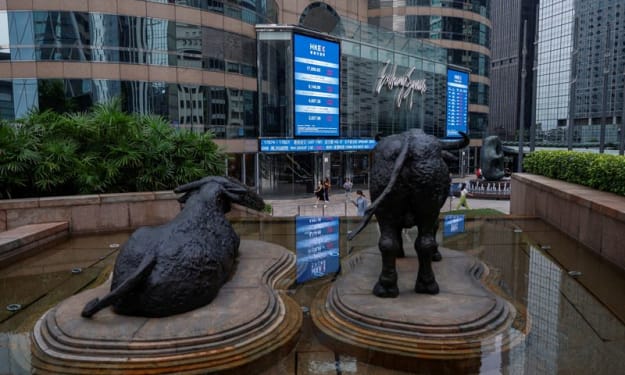Understanding the Stock Exchange Market
A Comprehensive Overview

Introduction
The stock exchange market plays a vital role in the global economy, facilitating the buying and selling of stocks and securities. It serves as a platform for companies to raise capital and for investors to allocate their funds in pursuit of financial growth. In this article, we will delve into the workings of the stock exchange market, explore its key components, understand the dynamics that drive it, and highlight its significance in the financial world.
1. What is a Stock Exchange?
A stock exchange is a regulated marketplace where securities, such as stocks, bonds, and derivatives, are bought and sold. It provides an avenue for companies to raise capital by issuing shares to the public, and for investors to buy and sell these shares in the secondary market. Stock exchanges operate based on a set of rules and regulations that ensure fairness, transparency, and efficiency in trading.
2. Functions of a Stock Exchange
a) Facilitating Capital Formation: Stock exchanges enable companies to raise capital by issuing shares to investors in initial public offerings (IPOs) or subsequent offerings. This capital infusion helps companies finance expansion plans, research and development, and other business initiatives.
b) Providing Liquidity: By providing a secondary market for securities, stock exchanges allow investors to buy and sell shares easily. This liquidity enhances market efficiency and allows investors to convert their investments into cash when needed.
c) Price Discovery: Stock exchanges play a crucial role in price discovery. Through the continuous buying and selling of securities, the interaction of supply and demand helps determine fair market prices. These prices are based on market participants' expectations, company performance, economic factors, and other relevant information.
d) Risk Management: Stock exchanges facilitate risk management through the use of derivative products, such as options and futures contracts. These instruments enable investors to hedge against potential losses or speculate on future price movements.
3. Major Stock Exchanges around the World
a) New York Stock Exchange (NYSE): The NYSE is the largest stock exchange globally, with a long history dating back to 1792. It lists many prominent U.S. companies and is known for its iconic trading floor. However, like most exchanges, it now operates electronically.
b) NASDAQ: Founded in 1971, NASDAQ is a technology-driven stock exchange that lists many technology, biotech, and growth-oriented companies. It is known for its high trading volumes and being home to major tech giants.
c) London Stock Exchange (LSE): The LSE is one of the oldest and most prestigious stock exchanges in the world. It offers a diverse range of securities and is a hub for international companies, particularly those from Europe and emerging markets.
d) Tokyo Stock Exchange (TSE): As the main stock exchange in Japan, the TSE is one of the largest in Asia. It lists prominent Japanese companies and serves as an important indicator of the country's economic health.
e) Shanghai Stock Exchange (SSE): The SSE is one of the two major stock exchanges in China and is among the largest in terms of market capitalization. It plays a crucial role in China's economic growth and provides access to domestic and international investors.
4. Participants in the Stock Exchange Market
a) Investors: Investors participate in the stock exchange market by buying and selling securities. They can be individuals, institutional investors such as pension funds and mutual funds, or even foreign investors seeking exposure to a specific market.
b) Stockbrokers: Stockbrokers act as intermediaries between investors and the stock exchange. They execute buy and sell orders on behalf of their clients and provide market insights and advice.
c) Market Makers: Market makers are individuals or firms that facilitate liquidity in the market by quoting both buy and sell prices for specific securities. They ensure that there is always a
market available for buyers and sellers.
d) Regulators: Regulatory bodies oversee stock exchanges to ensure fair and transparent trading practices. They monitor compliance with regulations, protect investor interests, and maintain market integrity.
5. Factors Influencing Stock Exchange Movements
a) Macroeconomic Factors: Economic indicators such as GDP growth, interest rates, inflation, and unemployment rates significantly impact stock exchange movements. Positive economic data can boost investor confidence and drive market gains, while negative data can lead to downturns.
b) Company Performance: The financial performance and outlook of individual companies influence their stock prices. Factors like revenue growth, profitability, management competence, and market share contribute to investors' assessment of a company's value.
c) Investor Sentiment: Investor sentiment, driven by market psychology, emotions, and perceptions, can heavily influence stock exchange movements. Positive sentiment can lead to buying frenzies and market rallies, while negative sentiment can trigger selling pressure and downturns.
d) Geopolitical Events: Political instability, trade disputes, natural disasters, and other geopolitical events can create market volatility and impact stock prices. Uncertainty in global affairs often prompts investors to reassess their risk exposure and adjust their portfolios accordingly.
6. Trading Mechanisms
a) Auction Market: In an auction market, buyers and sellers submit their orders to the exchange, which then matches the buy and sell orders based on price and time priority. The most commonly used auction mechanism is called continuous trading, where orders are matched continuously throughout the trading day.
b) Electronic Communication Networks (ECNs): ECNs are electronic platforms that automatically match buy and sell orders from multiple market participants. They provide a more automated and efficient trading process and are popular for high-frequency trading.
c) Over-the-Counter (OTC) Trading: OTC trading refers to the direct trading of securities between parties without the involvement of an exchange. It is common for smaller companies, bonds, and certain derivative products.
Conclusion
The stock exchange market serves as a critical pillar of the global financial system. It provides a platform for companies to raise capital and for investors to allocate their funds, promoting economic growth and wealth creation. Understanding the workings of the stock exchange market, its participants, and the factors influencing its movements is crucial for investors and anyone interested in the world of finance. By analyzing economic indicators, company performance, and investor sentiment, one can navigate the dynamic landscape of the stock exchange market and make informed investment decisions.
About the Creator
Enjoyed the story? Support the Creator.
Subscribe for free to receive all their stories in your feed. You could also pledge your support or give them a one-off tip, letting them know you appreciate their work.





Comments
There are no comments for this story
Be the first to respond and start the conversation.